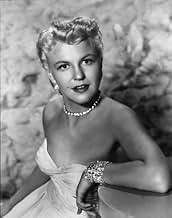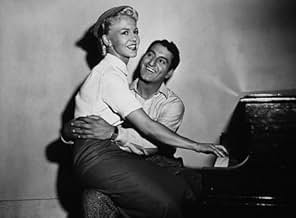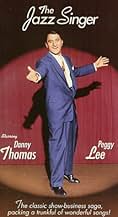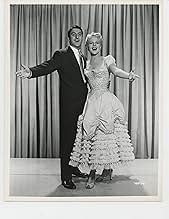Agrega una trama en tu idiomaJerry dreams of becoming a famous jazz singer, but to accomplish that, he must defy his father, a Jewish Cantor who opposes such a dream as a future for a son of his.Jerry dreams of becoming a famous jazz singer, but to accomplish that, he must defy his father, a Jewish Cantor who opposes such a dream as a future for a son of his.Jerry dreams of becoming a famous jazz singer, but to accomplish that, he must defy his father, a Jewish Cantor who opposes such a dream as a future for a son of his.
- Dirección
- Guionistas
- Elenco
- Nominado a 1 premio Óscar
- 1 nominación en total
Murray Alper
- Taxi Driver
- (sin créditos)
Jimmy Ames
- Music Store Proprietor
- (sin créditos)
Opiniones destacadas
Good grief.. to think I've seen it all.. Danny Thomas looks SO out of place in this mishmash. He seems really uncomfortable. He can't sing worth a lick, and when he's paired up with Peggy Lee (PEGGY LEE???) she easily.. EASILY outsings him! Maybe the director saw this and made him do the reall really bad comedy routines that he sometimes does in the film. Peggy Lee is okay, but the whole thing is a shambles. Good for a laugh, maybe.
Oy gevalt! What a disaster! Danny Thomas croons (badly), Danny Thomas tells jokes (badly) that are so corny and ancient Al Jolson would have been embarrassed to crack them, Danny Thomas emotes (badly, almost laughably). Opening scene had me wondering what all those goyim were doing in the temple! Peggy Lee was entertaining and a standout in this otherwise dreary film. The supporting cast were more-or-less adequate, with the mother and father characters well cast. Look for character actor William Schallert in a bit part, along with some other familiar faces. The Technicolor photography was superb. Watch all the scenes taking place in clubs across the nation and you'll notice that Danny and Peggy are using the exact same microphone in each one! My advice - stick with Jolie's groundbreaking original.
This is the second version of the much-filmed tale of the Jewish boy who wants to sing modern music, rather than becoming a cantor in the synagogue. This time, the character is called Jerry Golding and is played by Danny Thomas, a second-string singer and comedian of the fifties, perhaps best known for his TV series.
The story itself is sparse, but Thomas gets a chance to put across some swing numbers (one or two in the company of his lady friend Judy Lane, played by the sparky Peggy Lee, in a role originally planned for Doris Day). As Golding's parents, Eduard Franz and Mildred Dunnock give good value as they struggle to understand the culture clash which has seen their son look for fame as a popular crooner.
A minor film, and one not helped by the humorous approach (perhaps to accommodate Thomas's particular style). But, this version of 'The Jazz Singer' is as good a way as any to spend a Sunday afternoon.
The story itself is sparse, but Thomas gets a chance to put across some swing numbers (one or two in the company of his lady friend Judy Lane, played by the sparky Peggy Lee, in a role originally planned for Doris Day). As Golding's parents, Eduard Franz and Mildred Dunnock give good value as they struggle to understand the culture clash which has seen their son look for fame as a popular crooner.
A minor film, and one not helped by the humorous approach (perhaps to accommodate Thomas's particular style). But, this version of 'The Jazz Singer' is as good a way as any to spend a Sunday afternoon.
Jazz Singer, The (1952)
*** (out of 4)
Remake of the legendary 1927 Al Jolson picture has Danny Thomas playing Jerry Golding, a young Jewish man who returns home from the war and his father David (Eduard Franz) is expecting him to become the next Cantor. The Golding family males have been the Cantor for the past six generations but Jerry explains that he wants to try his hand at show business and this causes his father to turn his back on him. The 1927 version is best remembered for being the first talkie (even though it's mostly silent) and without that I think the movie is poor enough to where it would have been forgotten by today. I was really shocked by this remake because it's actually a very well-made little film with director Michael Curtiz really pouring his soul into it. I was surprised because it did seem like it was going to be a cheap, watered down musical but instead the direction was so good and the performances so strong that one really can't help getting caught up in the story. One major thing that works so well here is the relationship between the father and son. Their relationship really is expanded here and I think the love-hate thing works for some terrific drama. It also doesn't hurt that the performances are so strong. Thomas is wonderful in the leading role because he contains a certain kind of sensitive nature that you really care for him. He also has a terrific voice that makes you really understand why he wants to break into the business. Peggy Lee plays his love interest and is strong as well. Franz nearly steals the film as the strong father who expects his son to carry on the family tradition. Alex Gerry is also very good as the caring uncle. The soundtrack includes some very good numbers including Jerry Seelan's What Are New Yorkers Made Of, Cole Porter's Just One of Those Things, The Birth of the Blues and Peggy Lee's own This Is a Very Special Day. What really brings all of this together is the great direction by Curtiz. I was very surprised to see how loving and tender the actual story was and you can tell that there was something in the story that really stuck with the director because he goes all out in each scene to bring it some life. This version of THE JAZZ SINGER isn't that well known, which is a real shame.
*** (out of 4)
Remake of the legendary 1927 Al Jolson picture has Danny Thomas playing Jerry Golding, a young Jewish man who returns home from the war and his father David (Eduard Franz) is expecting him to become the next Cantor. The Golding family males have been the Cantor for the past six generations but Jerry explains that he wants to try his hand at show business and this causes his father to turn his back on him. The 1927 version is best remembered for being the first talkie (even though it's mostly silent) and without that I think the movie is poor enough to where it would have been forgotten by today. I was really shocked by this remake because it's actually a very well-made little film with director Michael Curtiz really pouring his soul into it. I was surprised because it did seem like it was going to be a cheap, watered down musical but instead the direction was so good and the performances so strong that one really can't help getting caught up in the story. One major thing that works so well here is the relationship between the father and son. Their relationship really is expanded here and I think the love-hate thing works for some terrific drama. It also doesn't hurt that the performances are so strong. Thomas is wonderful in the leading role because he contains a certain kind of sensitive nature that you really care for him. He also has a terrific voice that makes you really understand why he wants to break into the business. Peggy Lee plays his love interest and is strong as well. Franz nearly steals the film as the strong father who expects his son to carry on the family tradition. Alex Gerry is also very good as the caring uncle. The soundtrack includes some very good numbers including Jerry Seelan's What Are New Yorkers Made Of, Cole Porter's Just One of Those Things, The Birth of the Blues and Peggy Lee's own This Is a Very Special Day. What really brings all of this together is the great direction by Curtiz. I was very surprised to see how loving and tender the actual story was and you can tell that there was something in the story that really stuck with the director because he goes all out in each scene to bring it some life. This version of THE JAZZ SINGER isn't that well known, which is a real shame.
Rich looking redo of the legendary Jolson film that revolutionized the film industry ushering sound in and silence out.
The thing is that it was the technology that was the big deal about the film not the story which is pure hokum. However that seems to be something that the studio chose to ignore assuming the name recognition of the title would draw the crowds. The film did okay but it's a cornball exercise from start to finish. The main story was dated in '27 and is certainly no fresher in '52.
Danny Thomas just didn't have the strength of personality to make it on the big screen. Watching him it becomes apparent why he made it on TV and not cinema. He has a nice, likable demeanor, the sort that worked so well for Perry Como and Dinah Shore when they likewise abandoned the big screen for the small, but he doesn't dominate his scenes the way a leading man has to. He does sing well although not nearly well enough to be the rage of New York he's supposed to be.
That master of all genres Michael Curtiz moves the movie along well enough but it's too schmaltzy for him to be able to make it really memorable.
Putting all that aside the best reason to catch the film is the presence of Peggy Lee in the cast. This was her acting debut and while she doesn't have the instantly easy relaxed acting style of Doris Day the role doesn't put big demands on her, she did much better a few years on in Pete Kelly's Blues. It doesn't matter though when she sings which fortunately is often. When she does that all the hokeyness melts away and the viewer is treated to a legend doing what she does best, sing. An extra bonus is that she performs one of her biggest hits, Lover, in an elegant club setting giving you an idea of what it was actually like to see her in person.
Worth catching for Miss Lee but the story is sappy.
The thing is that it was the technology that was the big deal about the film not the story which is pure hokum. However that seems to be something that the studio chose to ignore assuming the name recognition of the title would draw the crowds. The film did okay but it's a cornball exercise from start to finish. The main story was dated in '27 and is certainly no fresher in '52.
Danny Thomas just didn't have the strength of personality to make it on the big screen. Watching him it becomes apparent why he made it on TV and not cinema. He has a nice, likable demeanor, the sort that worked so well for Perry Como and Dinah Shore when they likewise abandoned the big screen for the small, but he doesn't dominate his scenes the way a leading man has to. He does sing well although not nearly well enough to be the rage of New York he's supposed to be.
That master of all genres Michael Curtiz moves the movie along well enough but it's too schmaltzy for him to be able to make it really memorable.
Putting all that aside the best reason to catch the film is the presence of Peggy Lee in the cast. This was her acting debut and while she doesn't have the instantly easy relaxed acting style of Doris Day the role doesn't put big demands on her, she did much better a few years on in Pete Kelly's Blues. It doesn't matter though when she sings which fortunately is often. When she does that all the hokeyness melts away and the viewer is treated to a legend doing what she does best, sing. An extra bonus is that she performs one of her biggest hits, Lover, in an elegant club setting giving you an idea of what it was actually like to see her in person.
Worth catching for Miss Lee but the story is sappy.
¿Sabías que…?
- TriviaMichael Curtiz originally wanted Doris Day to play the role of Judy Lane.
- ErroresCatwalks, lights and other equipment rigged to the roof of the sound stage are clearly visible during a shot of an audience supposedly sitting in a real theater.
- ConexionesReferenced in Make Room for Daddy: Linda, the Performer (1960)
Selecciones populares
Inicia sesión para calificar y agrega a la lista de videos para obtener recomendaciones personalizadas
- How long is The Jazz Singer?Con tecnología de Alexa
Detalles
Taquilla
- Total en EE. UU. y Canadá
- USD 4,360,000
- Tiempo de ejecución1 hora 47 minutos
- Relación de aspecto
- 1.37 : 1
Contribuir a esta página
Sugiere una edición o agrega el contenido que falta

Principales brechas de datos
By what name was The Jazz Singer (1952) officially released in Canada in English?
Responda

































